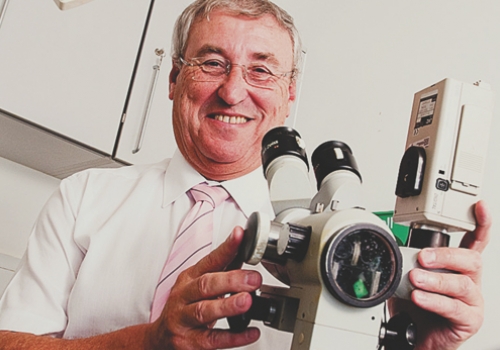Health News - Gynaecologist who helped pioneer new vaccine looks back on his time at the Royal Free

Published: 22 September, 2011
by TOM FOOT
ONE of the country’s top gynaecologists has switched off his colposcope machine for the last time after 25 years at the Royal Free Hospital.
Patrick Walker, who has helped save thousands of women from developing cervical cancer, retired from the Hampstead NHS trust on Friday.
The expert consultant was part of a team that discovered a link between cervical cancer and the human papillomavirus (HPV).
A HPV vaccine was developed following his findings and it is now routinely given to 12 and 13-year-old girls.
Mr Walker was honoured with a special event in the hospital on Friday attended by health professionals from across the country who spoke about the latest developments in the field.
The 61-year-old, who lives in Muswell Hill, said: “There always comes a time when it’s time to move on, but I am sad to be leaving the Royal Free. There’s nothing quite like being involved with a team who are doing something exciting.”
Mr Walker joined the hospital in 1986 where he developed a small colposcopy clinic into one of the largest and most respected in the country.
A colposcopy is a procedure where the lining of the cervix – the neck of the womb – is examined using a magnifying device called a colposcope. More than 15,000 patients have been seen in the Royal Free hospital clinic, with around 7,000 requiring follow-up treatment to remove pre-cancerous cells.
The service sees around 800 new patients a year and has become a centre of excellence for pre-invasive lower genital tract disease.
Mr Walker said: “The clinic was established by my colleague Philip Chalk.
“When I first joined the hospital, we were raising money to buy a new colposcope, a magnifying instrument, which is used to check the cervix for pre-cancerous cells, as well as our first gynecological laser which is used to remove these cells.
Now we’re using this equipment all the time and saving many lives because of it.
“The major development was when women began to be invited for routine cervical screening in 1988. As a result, nationally the death rate from cervical cancer has halved since 1988.”
For the past three years Mr Walker has been President of the International Federation for Cervical Pathology and Colposcopy.
He has given lectures in 23 countries, advising healthcare professionals on how to set up a cervical screening programme, how to recognise infection from HPV and providing the best treatment.
He plans to continue with some private practice in his retirement – and to spend more time on the golf course.



